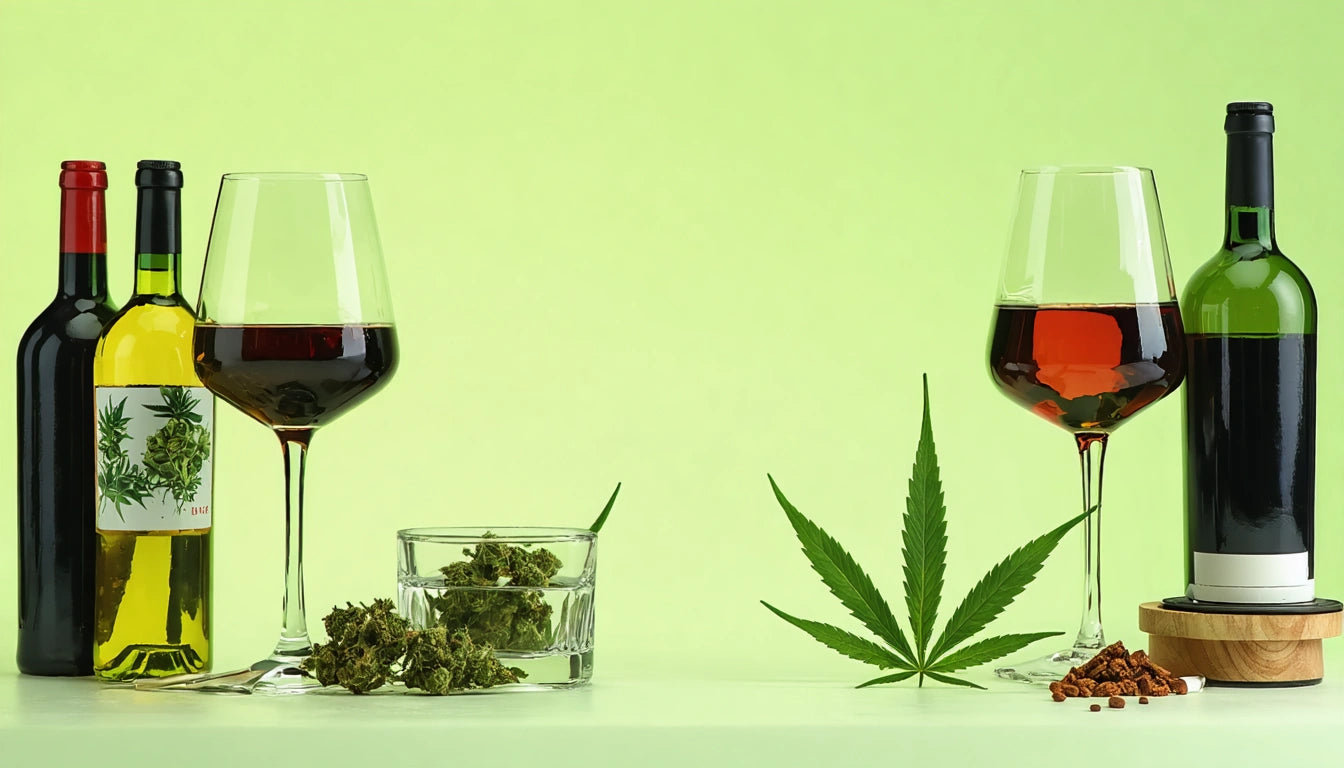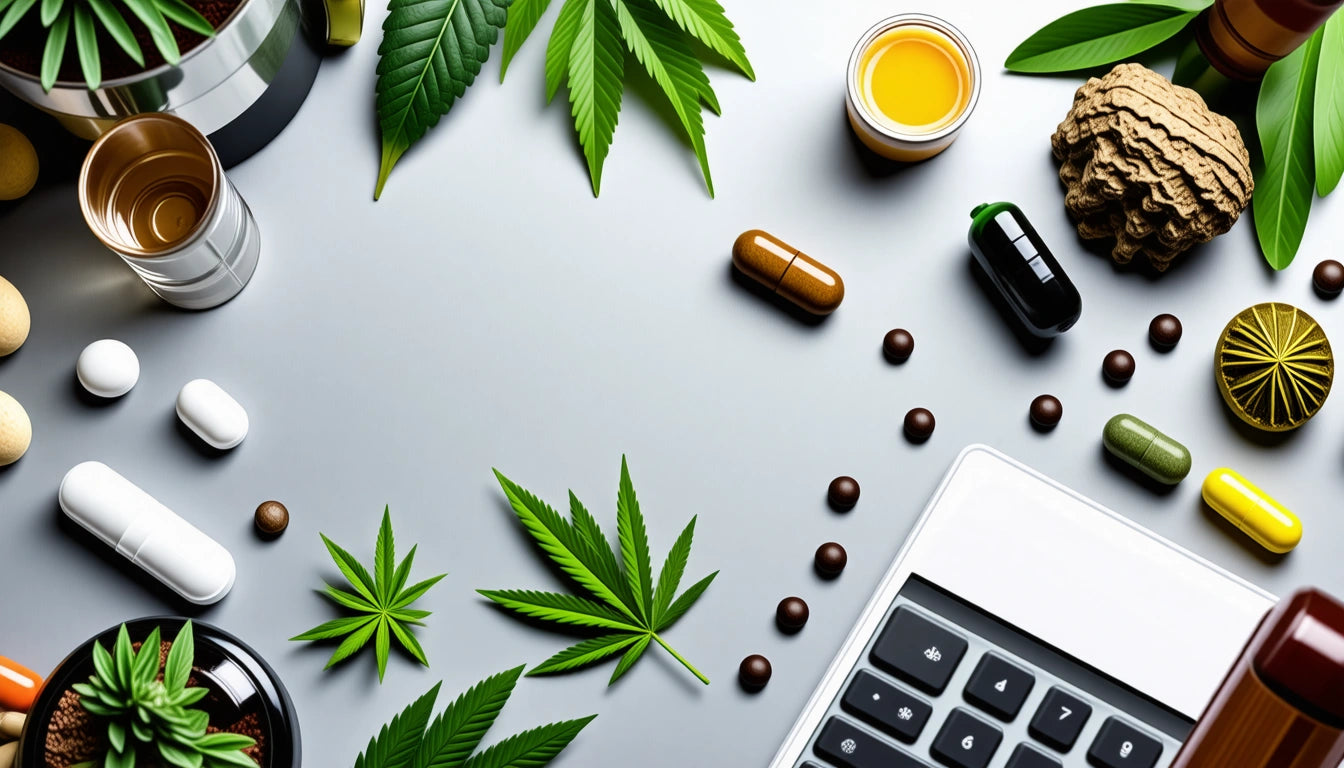Table of Contents
Alcohol vs. Weed: Which Is Worse for Your Health?
The debate over whether alcohol or weed is worse for health continues to evolve as cannabis legalization spreads and research expands. Both substances affect the body and mind differently, with distinct risk profiles that aren't always accurately represented in public discourse. Understanding these differences helps consumers make informed decisions about their health.
Immediate Effects on Body and Mind
Alcohol and cannabis produce markedly different immediate effects. Alcohol, a central nervous system depressant, slows brain function and alters coordination, speech, and judgment. Cannabis primarily works through the endocannabinoid system, affecting perception, mood, and cognitive function.
Alcohol's Short-Term Effects
- Reduced inhibition and judgment
- Slurred speech and impaired coordination
- Potential for alcohol poisoning at high doses
- Nausea and vomiting
- Memory impairment (blackouts at high doses)
Cannabis Short-Term Effects
- Altered perception and sensory experience
- Increased appetite
- Dry mouth and red eyes
- Potential anxiety or paranoia (especially with high-THC products)
- Impaired short-term memory and attention
When comparing the effects and addictiveness of alcohol and cannabis, the immediate risk profile for alcohol appears more severe, particularly regarding overdose potential. Unlike alcohol, cannabis has no documented cases of fatal overdose from the substance alone.
Long-Term Health Impacts
The chronic use of either substance carries health risks, but their profiles differ substantially in severity and organ systems affected.
Alcohol's Long-Term Health Risks
- Liver disease (fatty liver, alcoholic hepatitis, cirrhosis)
- Cardiovascular problems (hypertension, cardiomyopathy)
- Increased cancer risk (mouth, throat, esophagus, liver, breast)
- Neurological damage and cognitive decline
- Weakened immune system
Cannabis Long-Term Health Considerations
- Respiratory issues (when smoked)
- Potential cognitive effects with heavy adolescent use
- Possible psychological dependence
- Cannabinoid Hyperemesis Syndrome (in some heavy users)
- Potential interactions with developing brains
Research suggests that when asking which is more harmful between alcohol and weed, alcohol's long-term physiological damage appears more extensive and severe. However, cannabis research is still catching up after decades of prohibition-related limitations.
Addiction Potential and Dependency
Both substances can lead to dependency, but their addiction profiles differ significantly.
Alcohol has a well-documented physical dependency pattern. Heavy drinkers develop tolerance, requiring more alcohol to achieve the same effects, and experience withdrawal symptoms that can be life-threatening. According to the National Institute on Alcohol Abuse and Alcoholism, about 14.5 million Americans have Alcohol Use Disorder.
Cannabis dependency tends to be psychological rather than severely physical. While withdrawal symptoms exist (irritability, sleep disturbances, decreased appetite), they're generally milder than alcohol withdrawal. Approximately 9% of cannabis users develop dependency, compared to about 15% for alcohol.
For those monitoring their consumption, precise measurement tools like digital scales can help cannabis users track intake more accurately, potentially reducing overuse risks.
Organ Damage and Physiological Effects
When examining what's worse for you, alcohol or weed, organ damage profiles differ substantially.
Alcohol directly damages multiple organ systems:
- Liver: Processes 90% of alcohol consumed, leading to inflammation and scarring
- Brain: Causes neuronal damage and brain shrinkage with long-term use
- Heart: Contributes to cardiomyopathy and arrhythmias
- Pancreas: Can trigger acute and chronic pancreatitis
Cannabis has fewer documented direct organ damage pathways:
- Lungs: Smoking cannabis can cause bronchial irritation (though vaporizing reduces this risk)
- Cardiovascular: May temporarily increase heart rate and blood pressure
- Reproductive: Potential effects on fertility and pregnancy outcomes
Exploring the pros and cons of cannabis use reveals a more complex picture than simple good-versus-bad narratives suggest.
Mental Health Considerations
Both substances interact with mental health, though in different ways.
Alcohol is a depressant that can worsen depression, anxiety, and other mood disorders. Long-term use is associated with increased suicide risk and cognitive decline. Many people initially use alcohol to self-medicate anxiety, creating a problematic cycle as withdrawal increases anxiety symptoms.
Cannabis has a complex relationship with mental health. For some, it provides relief from anxiety, PTSD, and depression symptoms. For others, particularly those with predispositions to certain conditions, high-THC cannabis may trigger or worsen anxiety, psychosis, or schizophrenia. The relationship appears dose-dependent and varies based on cannabinoid profile and individual factors.
Social Harm and Public Safety
When considering which is worse, alcohol or weed, social and public health impacts reveal significant differences.
Alcohol is strongly associated with:
- Aggressive behavior and violence
- Higher rates of domestic abuse
- More severe and frequent traffic accidents
- Public disorder and property damage
- Workplace accidents and lost productivity
Cannabis is less frequently linked to:
- Aggressive behavior (often reduces aggression)
- Severe traffic accidents (though still impairs driving)
- Public disturbances or violence
- Workplace accidents (though still affects performance)
Understanding cannabis in cultural context helps explain changing perceptions about its relative harms compared to alcohol.
Making Informed Health Choices About Cannabis and Alcohol
The question of whether alcohol or weed is worse ultimately depends on individual health profiles, usage patterns, and personal risk factors. Current evidence suggests alcohol poses greater risks for physical health damage, addiction, and social harm at population levels.
For those who choose to use either substance, harm reduction approaches include:
- Moderation and mindful consumption
- Understanding personal risk factors
- Avoiding driving or operating machinery
- Being aware of potential drug interactions
- Choosing consumption methods that minimize harm
As cannabis legalization expands, more research will help clarify the comparative health impacts of these substances. Meanwhile, examining the health effects of alcohol versus weed remains an important consideration for public health policy and individual decision-making.











Leave a comment
All comments are moderated before being published.
This site is protected by hCaptcha and the hCaptcha Privacy Policy and Terms of Service apply.